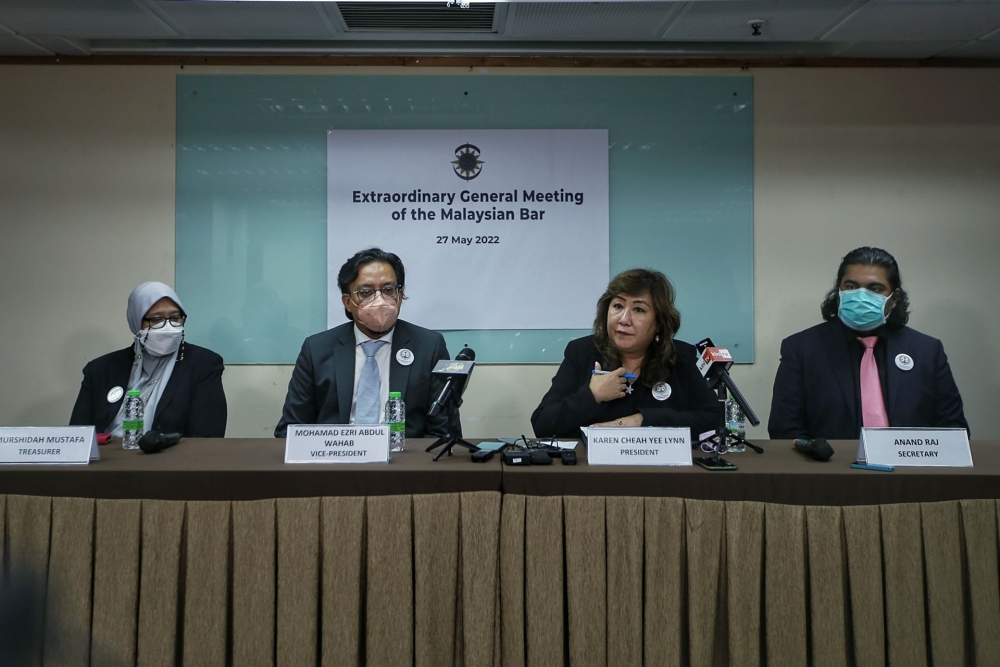KUALA LUMPUR, March 16 — The Malaysian Bar — the umbrella body representing lawyers in Peninsular Malaysia — will be discussing and voting today on whether to adopt resolutions to challenge the Pardons Board’s reduction of convicted former prime minister Datuk Seri Najib Razak’s jail time and fine in the SRC International Sdn Bhd case.
In its 78th annual general meeting (AGM) this morning, the Malaysian Bar is also expected to decide whether to resolve to condemn the federal government over its planned “regressive” amendments to citizenship laws in the Federal Constitution.
In the motion proposed by former Malaysian Bar president Zainur Zakaria and seconded by former Malaysian Bar president Yeo Yang Poh, the Malaysian Bar is being asked to consider the Pardons Board’s recent decision in Najib’s case.
Based on the motion sighted by Malay Mail, it argued that Najib’s application for a pardon should not have been processed and decided as he had only served one-and-a-half years of his 12-year jail term and that he had not paid the RM210 million fine on him, among other things.
The motion also states the Malaysian Bar as viewing the Pardons Board to have acted “ultra vires” or beyond Article 42 of the Federal Constitution and against the law, when the Pardons Board decided to reduce Najib’s jail term by half and to reduce his fine to RM50 million.
The motion proposed by Zainur wants the Malaysian Bar to resolve for the incoming Bar Council — on behalf of and in the Malaysian Bar's name — to challenge the legality of the Pardons Board’s decision in Najib’s case, through the urgent filing of a court challenge against both the Pardons Board and Najib.
Yesterday, news portal Malaysiakini reported Najib’s lead defence lawyer Tan Sri Muhammad Shafee Abdullah as declining to comment on the motion regarding the Pardons Board’s decision regarding his client.
Separately, incoming Bar Council member Abhilaash Subramaniam has proposed a motion “to condemn the government of Malaysia on the proposed regressive amendments to citizenship laws”.
In her motion seconded by incoming Bar Council member Collin Arvind Andrew and lawyer Abang Mohd Iwawan Abg Narawi@Abg Nawawi, it includes five main parts for the Malaysian Bar to resolve on.
This includes the resolution for the Malaysian Bar to condemn the government on the regressive amendments which would erode the rights and be a threat to stateless persons here; and for the Malaysian Bar to call on the Malaysian government to proceed with the amendment enabling automatic citizenship for Malaysian mothers’ overseas-born children and to either abandon or defer the proposed regressive amendments to Malaysian citizenship laws.
The motion also seeks to have the Malaysian Bar resolve to demand the Malaysian government to adopt and implement the proposals in the Human Rights Commission of Malaysia’s (Suhakam) 2023 report titled “Human Rights and Statelessness in Peninsular Malaysia”; and to demand the government to set up an Ombudsperson Office to fast-track citizenship applications and give better information and to improve the citizenship application process, among other things.

Lastly, the motion wants the Bar Council to consider and (if suitable) start or join in court proceedings to eliminate Malaysia's “shameful legacy” of statelessness.
These two motions are part of nine motions listed on the agenda for the AGM today.
The other motions to be discussed at the AGM today include four motions proposed by Malaysian Bar president and Bar Council chairman Karen Cheah Yee Lynn, namely on the Continuing Professional Development Scheme; the Malaysian Bar as a self-regulatory body for anti-money laundering and counter financing of terrorism matters; amendment to the rules for the conduct of the Malaysian Bar’s general meetings; and on increasing judges’ mandatory retirement ages.
The three other motions are proposed by lawyer Charles Hector Fernandez, namely growing concern over the government’s delay in repealing draconian laws and bringing about needed reforms to ensure justice in Malaysia; the boycott of Security Offences (Special Measures) Act 2012 (Sosma) cases as a strategy to expedite the repeal of this law; as well as to promote greater attendance of lawyers who work far from Kuala Lumpur at the Malaysian Bar’s AGMs or extraordinary general meetings (EGMs) by providing compensation and other assistance.
The AGM will be held at the Dewan Tun Abdul Razak, Menara Kembar Bank Rakyat in Kuala Lumpur.
The quorum required for today’s AGM is 500 members. According to the Malaysian Bar’s website, there were 21,570 members as of February 15, 2023.
Based on the Legal Profession Act 1976 (LPA), the 42-member Bar Council for the new term of 2024/2025 will take office after today’s AGM concludes.
Under Section 54(1) of the LPA, the Bar Council elects the Malaysian Bar president, vice-president and secretary from among Bar Council members, and provides that those elected to these three roles cannot hold office for more than two consecutive years.
According to the Malaysian Bar’s website, the Bar Council elects those three office-bearers and the Malaysian Bar treasurer every year at its first meeting, which is traditionally carried out immediately after the AGM. The LPA does not mention the treasurer post and it is not caught by the maximum two consecutive years rule.
Outgoing Malaysian Bar president Cheah, vice-president Mohamad Ezri Abdul Wahab, secretary Anand Raj and treasurer Murshidah Mustafa have served in their positions for two consecutive years now, namely 2022/2023 and 2023/2024. This would mean the top three posts are expected to see changes today.





















